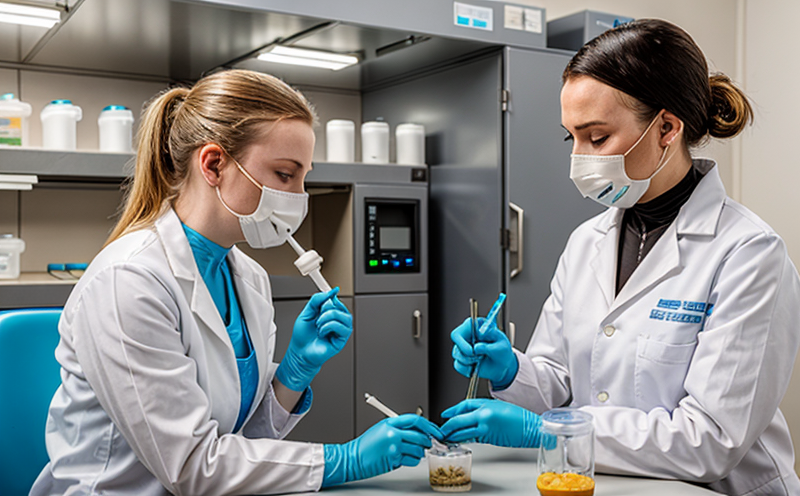EN 21203 Mycotoxin Residue Profiling in Animal-Origin Foods
EN 21203 is a European standard that outlines the methodology for the quantitative analysis of mycotoxins in animal-origin foods. This service ensures compliance with EU regulations and helps protect public health by detecting potentially harmful levels of mycotoxins, which are toxic secondary metabolites produced by certain fungi.
Mycotoxins can contaminate foodstuffs during various stages of production, processing, storage, or distribution. Their presence poses significant risks to both human and animal health. The standard is particularly relevant for sectors dealing with meat products, dairy goods, and other animal-origin foods. It provides a comprehensive approach to profiling mycotoxin residues, ensuring that the final product meets stringent safety standards.
The testing process involves several critical steps: sample collection, extraction, purification, quantification, and confirmation. The standard specifies detailed protocols for each step to ensure accurate and reliable results. Sample preparation is crucial; it includes homogenization of the sample followed by extraction using appropriate solvents. This ensures that all target mycotoxins are released from their binding sites.
The quantification process typically uses liquid chromatography-tandem mass spectrometry (LC-MS/MS), which offers high sensitivity and selectivity necessary for detecting even trace levels of these toxic compounds. The confirmation step ensures that the identified peaks correspond to known mycotoxins by comparing their retention times, fragment ions, and collision energy with those in a reference database.
The acceptance criteria specified in EN 21203 are based on EU limits for each mycotoxin type. These limits are stringent and designed to minimize exposure risks. Compliance with these standards is essential for maintaining the integrity of food safety systems across Europe.
| Mycotoxin | EU Limit (µg/kg) |
|---|---|
| Aflatoxin B1 | 2.0 |
| Zearalenone | 50 |
| T-2 Toxin | 300 |
| Ochratoxin A | 10 |
Benefits
Compliance with EN 21203 offers numerous benefits to stakeholders within the food and feed industry. For quality managers, it provides a robust framework for ensuring product safety and maintaining brand reputation. Compliance officers benefit from clear guidelines that simplify regulatory compliance processes.
R&D engineers gain valuable insights into potential contamination sources and can develop strategies to mitigate risks. Procurement teams can ensure supplier reliability by verifying adherence to these stringent standards.
Industry Applications
| Application | Description |
|---|---|
| Animal Feed Manufacturing | Ensures that feed ingredients meet safety standards, protecting animal health. |
| Dairy Processing | Monitors milk and dairy products for mycotoxin contamination to safeguard consumer health. |
| Poultry Production | Guarantees that feed used in poultry production is free from harmful toxins, ensuring optimal growth rates and egg quality. |
| Bovine Meat Processing | Verifies the safety of meat products derived from cattle, reducing the risk of foodborne illnesses. |
Quality and Reliability Assurance
The implementation of EN 21203 requires stringent quality control measures at every stage. Rigorous training programs are provided to staff involved in sample handling, extraction, purification, quantification, and confirmation processes. Regular calibration and validation of equipment ensure accurate results.
Our laboratory adheres strictly to ISO/IEC 17025 accreditation requirements, ensuring that all tests conducted meet the highest international standards for proficiency and reliability. We employ state-of-the-art instrumentation and follow protocols outlined in EN 21203 meticulously to deliver accurate, reproducible results.
Our team of experts continuously updates its knowledge base with new research findings and methodological advancements related to mycotoxin detection. This ensures that our services remain cutting-edge and aligned with the latest regulatory requirements.





